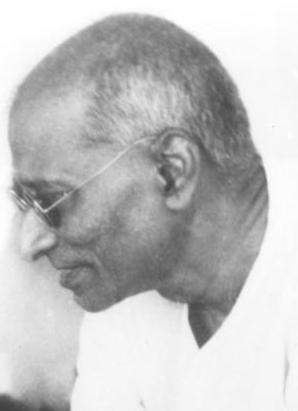Rajagopalachari (12 February 1949), quoted in [Rajmohan Gandhi, Rajaji: A Life, http://books.google.com/books?id=JjPHeRd7_UYC&pg=PA475, 1997, Penguin Books India, 978-0-14-026967-3, 286]
Spoken by C.R when Mahatma Gandhi (Bapu) was assassinated.
C. Rajagopalachari: Zitate auf Englisch
“You must learn how to marry and live a married life.”
Rajagopalachari, quoted in: Shiri Ram Bakshi (1990) C. Rajagopalachari, p. 160
Kontext: You must learn how to marry and live a married life. That is true Home Science. Home is made by ma-ried people and children and the science deals with that subject. Please remember that Home Science is not preparation for a profession or a trade; but it is preparation for marriage.
Rajagopalachari, quoted in: Myron Weiner (1961) Introduction to the civilization of India: developing India. University of Chicago. College, p. 271
His advocacy of right-wing alternative to the Congress.
Rajagopalachari, quoted in: Monica Felton (1962) Rajaji, p. 57
Chakravarti Rajagopalachari (1960) The voice of the uninvolved: speeches and statements on atomic warfare and test explosions. p. 167
C. Rajagopalachari (1900) Hinduism, doctrine and way of life https://archive.org/stream/cu31924091600688#page/n37/mode/2up, p. 31; As quoted in [Rao, K.L. Seshagiri, Mahatma Gandhi And Comparative Religion, http://books.google.com/books?id=HSGWZ9mpNl4C&pg=PA110, 1 January 1990, Motilal Banarsidass Publ., 978-81-208-0767-9, 110–]
Rajagopalachari, quoted in: Tek Chand (1972) Liquor Menace in India, p. 116
Rajagopalachari, quoted in: R. K. Murthi (1979) Rajaji, life and work, p. 155
The National Christian Council Review, December 1956, p. 490. quoted from Madhya Pradesh (India), Goel, S. R., Niyogi, M. B. (1998). Vindicated by time: The Niyogi Committee report on Christian missionary activities. ISBN 9789385485121
Rajagopalachari (1942) quoted in: Ramachandra Guha, Gandhi and Rajaji, 2 February 2003, 26 November 2013, The Hindu http://www.hindu.com/thehindu/mag/2003/02/02/stories/2003020200680300.htm,
Rajaji opposing Gandhi on the Quit India movement in 1942.
Rajagopalachari (1959); Quoted in [Reddy, Deepa S., Religious Identity and Political Destiny: Hindutva in the Culture of Ethnicism, http://books.google.com/books?id=Sn7akxOaISkC&pg=PA170, 2006, Rowman Altamira, 978-0-7591-0686-4, 170–]
